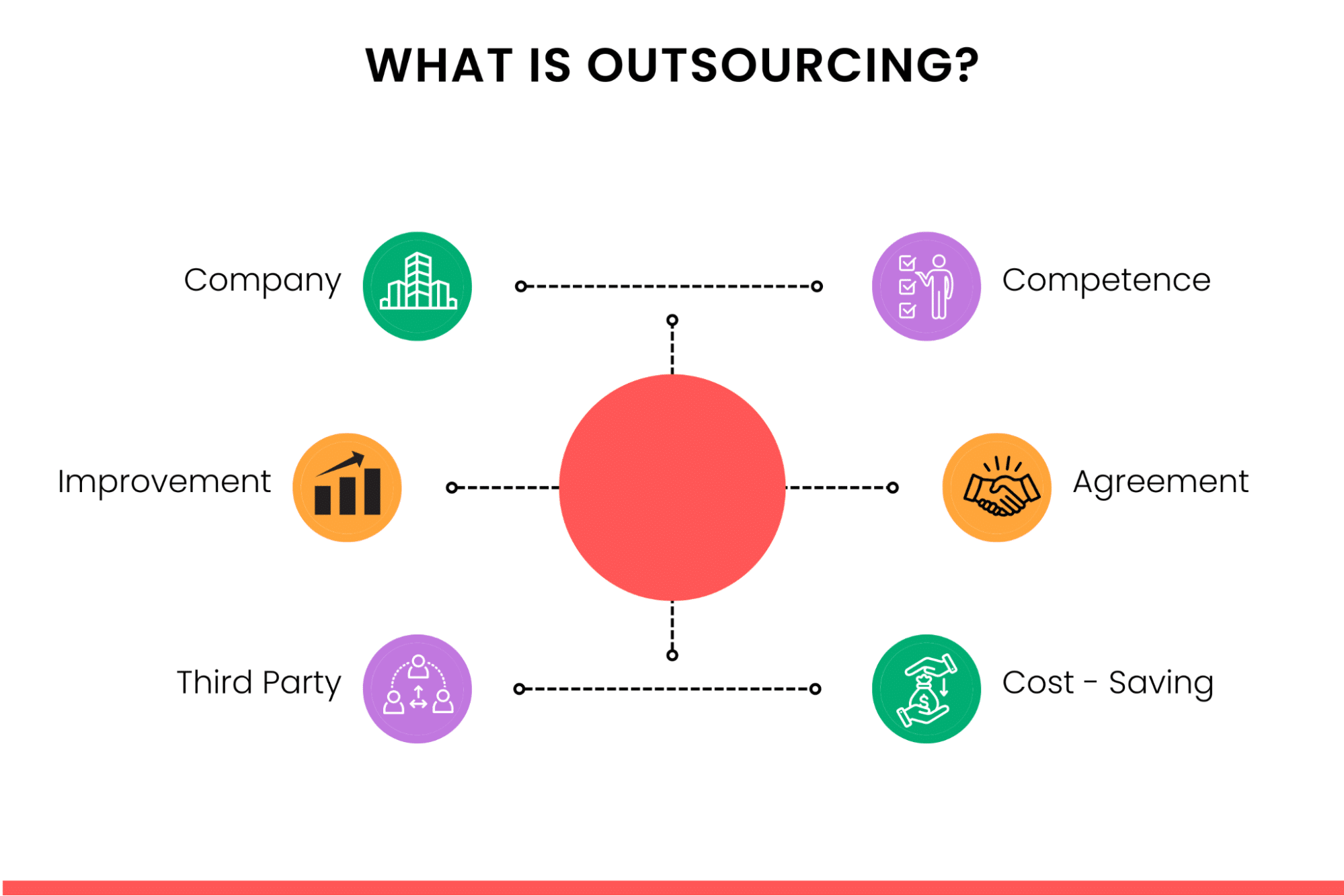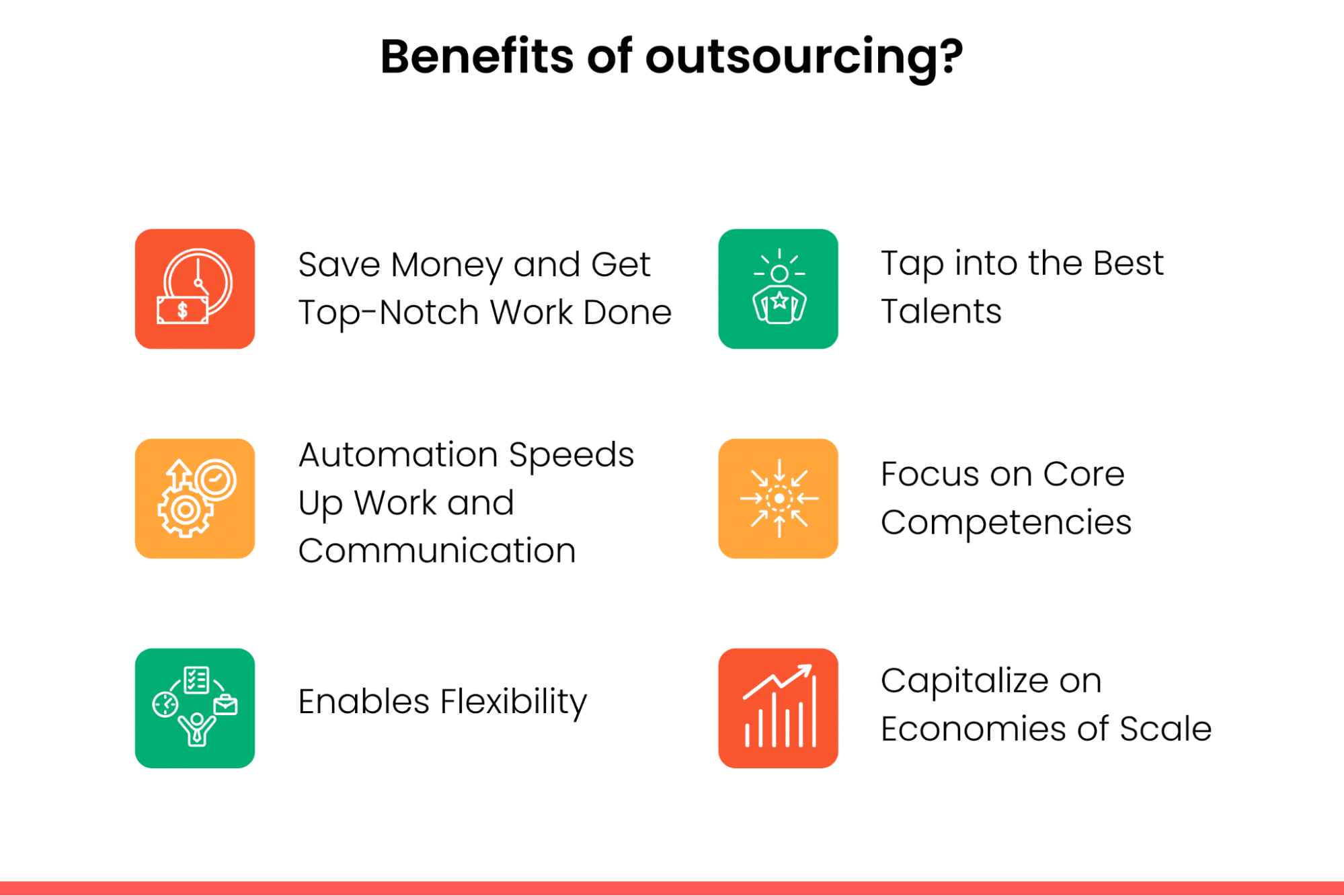As companies expand, one of the primary challenges they face is effectively managing non-core business functions. While every team member brings a unique skill set to the table, these skills may not necessarily extend to areas like customer service, accounting, or web development.
This is where the power of outsourcing comes into play. By entrusting these specialized tasks to experts, you can concentrate on your company’s core competencies and save on operational costs.
Thanks to advancements in technology, outsourcing has gained significant traction, making it simpler than ever to collaborate with professionals around the globe. Now, businesses of all sizes can effortlessly find tailored solutions with just a few clicks.
What is outsourcing?
Outsourcing involves assigning specific business operations to an external service provider. This typically includes handing over various non-core tasks, such as HR functions, customer support, or payroll management, to a specialized third-party firm.
The primary objective of outsourcing is cost efficiency, achieved through leveraging economies of scale. These third-party companies often serve multiple clients, allowing them to optimize and streamline their operations for cost-effectiveness.
It’s crucial to distinguish outsourcing from offshoring, however. Offshoring refers to relocating a company’s operations to another country, primarily to benefit from lower labor expenses. In contrast, outsourcing can occur even if all participating parties are based within the same country.
Business process outsourcing (BPO)
Business Process Outsourcing (BPO) is one of the most commonly used terms in today’s corporate landscape for companies aiming to scale their operations. Although it doesn’t capture every nuance of what outsourcing can entail, BPO has become almost synonymous with the concept. The term can be further specialized into subsets like “information technology outsourcing” (ITO) or “knowledge process outsourcing” (KPO), depending on the specific area of expertise being outsourced.
In a typical BPO arrangement, a client company forms a contractual agreement with a service provider to manage certain non-core business activities. These activities can vary widely and include customer support, technical assistance, data management, and bookkeeping tasks, among others. The aim is to free up the client company’s internal resources, allowing them to focus on core business objectives and functions that provide a competitive edge.
Once contracted, the service provider takes on the responsibility for these non-core processes, handling them on behalf of the client company. This often involves deploying a team of specialized experts in the respective field. These professionals have the know-how and resources to carry out the outsourced tasks in an efficient manner, generally more so than an in-house team might be capable of.
The effectiveness of BPO lies not just in its cost-saving potential but also in the quality of service that specialized providers bring to the table. By outsourcing to a service provider with a track record of expertise, the client company can often expect quicker, more efficient, and sometimes even more innovative solutions to their operational challenges. Thus, BPO serves as a strategic move for companies looking to grow while maintaining high operational standards.
The Future of Outsourcing
The outsourcing industry has witnessed remarkable growth in recent years, and projections suggest that this trend is likely to continue. According to a research study, the global outsourcing market is anticipated to expand to a staggering US$40.16 billion by 2025. The rise of remote work culture, accelerated by technological advancements and the ongoing digital transformation, provides businesses with more opportunities to tap into global talent pools. As a result, outsourcing is poised to play an even more significant role in the corporate landscape going forward.
Companies worldwide are becoming increasingly aware of the advantages of outsourcing and are investing accordingly. By allocating resources to technology, process improvements, and employee training, these organizations are streamlining their operations. This optimization enables them to concentrate on their core competencies and offer specialized services, thereby enhancing customer satisfaction and potentially increasing market share.
Job market trends also validate the growing popularity of outsourcing. Analysis of LinkedIn job postings in countries such as Australia, India, and Singapore shows a significant increase in listings that offer remote work options compared to the data from a year ago. This change suggests a shift in organizational strategies toward leveraging offshore talent to achieve business goals and execute strategic plans effectively.
The rising inclination toward remote and offshore employment options highlights the evolving nature of work and the strategic importance of outsourcing for modern businesses. It allows companies to access a diverse skill set without geographical limitations, supporting their growth ambitions while also focusing on quality and cost-efficiency. As we look to the future, it’s clear that outsourcing is set to continue its trajectory as a key enabler of global business success.
What are the key benefits of outsourcing?
The aspect of cost plays a pivotal role in the outsourcing equation. Every business aims to minimize overhead expenses and reduce costs related to tasks outside their primary expertise.
Outsourcing’s advantages can be broadly categorized into two groups: financial and operational. Before delving into the intricacies of the financial benefits, let’s first skim through some of the operational advantages that outsourcing brings to the table.
Operational benefits of outsourcing
Outsourcing serves as a strategic lever that enables companies to concentrate on their core business activities. By offloading non-essential tasks to specialized service providers, businesses can liberate valuable internal resources and direct their focus toward growth and innovation. Furthermore, outsourcing provides access to a diverse, skilled workforce that may otherwise be unavailable or too costly to employ directly. This offers the dual benefit of enhancing the quality of work while providing the flexibility to scale operations either up or down as circumstances dictate.
Another advantage of outsourcing lies in the superior facilities and cutting-edge technology that service providers often possess. Most small to medium-sized companies find it financially impractical to invest heavily in state-of-the-art infrastructure or advanced software systems. However, outsourcing companies typically operate with high-quality equipment and up-to-date technology, ensuring that tasks are performed efficiently and to a high standard. This allows client companies to reap the benefits of the latest advancements without the hefty investment.
Service providers also tend to have well-established processes and rigorous protocols in place to ensure quality and consistency. Their expertise often extends beyond mere task execution to include optimizing workflows, enhancing productivity, and even innovating within their domain. Consequently, the quality of the outsourced work is often higher and more reliable than what could be achieved in-house.
Last but certainly not least, outsourcing can act as a risk mitigation strategy. By transferring specific business functions to an external provider, companies also shift some of the associated risks—such as regulatory compliance or data security concerns—to that provider. This division of responsibilities can provide businesses with a certain level of comfort and security, allowing them to concentrate on strategic planning and other high-priority activities.
Save Money and Get Top-Notch Work Done
In the contemporary business landscape, the growing emphasis on outsourcing is hardly surprising, given the dual objectives of companies to reduce costs while still delivering exceptional services. To achieve this delicate balance, many organizations are increasingly resorting to outsourcing specific functions like customer support or internal operations. This strategy not only leads to substantial cost savings but also ensures that the work performed is of high quality.
Outsourcing offers businesses an invaluable support mechanism, enabling them to stay competitive and even gain a leading edge in their respective markets. Additionally, it provides the flexibility and resources needed to venture into new areas and geographic markets, expanding the company’s reach and potential for growth.
Tap into the Best Talents
One key driver shaping the future of outsourcing is its ability to grant businesses access to a global reservoir of talent without the necessity of local or international full-time hires. By engaging qualified professionals from countries with more affordable labor rates, companies can enlist expertise that might be unavailable or prohibitively expensive in their own locality. This is especially advantageous for organizations seeking specialists with niche skill sets or specific knowledge bases that are scarce in their own geographical area.
Indeed, Business Process Outsourcing (BPO) further broadens this talent pool for companies. When tasks are outsourced, businesses can tap into a worldwide network of subject matter experts. This global outreach not only enhances the quality of work but also endows businesses with a competitive edge, furnishing them with the best talent available globally.
Automation Speeds Up Work and Communication
As technological advancements continue to shape the business landscape, the scope and potential of outsourcing on a global scale are also expanding. Automation technologies, for instance, have streamlined various processes, making them faster and more efficient. This technological leverage translates into cost savings for both parties involved in an outsourcing relationship. Advanced algorithms and automated systems are revolutionizing how tasks are performed, thereby increasing efficiency and potentially reducing costs on both ends of the transaction.
Another significant development is the rapid advancement in communication technologies, which has made remote work more practical and efficient than ever before. A mere five years ago, the logistical challenges of remote collaboration were far more cumbersome, but today, digital platforms enable seamless communication and project management across borders. Teams located in different countries can now collaborate in real-time, share files instantaneously, and even engage in video conferencing, all without having physically met each other.
Turning to Business Process Outsourcing (BPO), it’s clear that this model has eliminated many of the logistical challenges that used to hamper businesses. Companies are no longer restrained by geographical limitations and can more conveniently leverage overseas resources. Outsourcing to a BPO has not only streamlined operational complexities but also created a more agile and flexible business model.
The removal of barriers to international collaboration opens up a plethora of new opportunities, both currently and for the future. Companies are more empowered than ever to scout for global talent, tap into new markets, and execute cross-border deals. This expansive environment, facilitated by technological progress, is setting the stage for even more dynamic and lucrative outsourcing partnerships in the years to come.
Focus on Core Competencies
Over the past two decades, outsourcing has emerged as a dominant strategy in the business world, capturing the attention and resources of organizations across various industries. One of the primary driving forces behind this trend is the myriad of benefits it brings to the table for businesses. By leveraging the expertise of external vendors, companies can focus more intently on their primary missions, capitalizing on what they do best while still ensuring that essential but non-core functions are expertly managed.
The principal advantage of outsourcing lies in its ability to enable companies to concentrate on their core competencies. In today’s competitive marketplace, organizations need to be agile, innovative, and highly specialized in their domain to gain an edge. Outsourcing non-core activities allows them to do just that. For instance, a tech company can focus on software development while outsourcing customer service, freeing up valuable time and resources for innovation and quality improvement.
Outsourcing also contributes significantly to enhancing operational efficiency and productivity. When companies delegate tasks to specialized vendors, the work is generally completed more quickly and at a higher standard than if it were done in-house. This is mainly because specialized vendors have the expertise, technologies, and processes already in place to perform the tasks efficiently. This increased efficiency can then translate into faster delivery times, higher quality products or services, and ultimately, more satisfied customers.
In addition to bolstering efficiency and focus, cost savings remain a compelling advantage of outsourcing. Specialized service providers often benefit from economies of scale, which allows them to offer services at a more competitive price point. Businesses can tap into these savings, reducing their operational costs while maintaining or even enhancing the quality of the outsourced work. In the long term, these financial savings can be channeled back into core activities, driving business growth and competitive advantage.
Enables Flexibility
Besides the monetary benefits, outsourcing grants businesses a heightened degree of adaptability. This model empowers organizations to either selectively outsource individual tasks or delegate entire operations to external vendors. Such flexibility is invaluable for swiftly adapting to market fluctuations and capitalizing on emerging opportunities, rather than being constrained by limited resources or manpower.
Take, for instance, a company opting to outsource its customer service functions during high-demand seasons. By doing so, the organization can effectively cater to customer needs without the necessity of recruiting extra staff or investing in additional infrastructure. This strategic agility enables the company to remain responsive and efficient, ultimately better serving both its immediate needs and long-term goals
Capitalize on Economies of Scale
In today’s competitive business landscape, organizations of every size are increasingly adopting outsourcing as a strategic tool to benefit from economies of scale. The act of delegating tasks and services to specialized external vendors allows these businesses to not only mitigate operational costs but also significantly enhance overall efficiency. Outsourcing has evolved into a universal business strategy, providing scalable solutions for various tasks ranging from customer service to data management, which often results in a more cost-effective and streamlined operation.
This approach to cost-cutting and efficiency becomes even more potent when companies collaborate with other organizations that have outsourced similar tasks or services. Such collaborations can magnify the benefits for all parties involved. By pooling their collective requirements, these collaborating companies can often negotiate better terms and rates with outsourcing providers. The effect is a synergistic relationship where cost savings are amplified due to the coalescence of resources and demands from multiple organizations.
Therefore, the advantages of outsourcing go beyond simple cost reduction and increased efficiency for individual businesses. When integrated into collaborative business strategies, outsourcing can serve as a catalyst for optimizing resources across a network of companies. By doing so, each participating organization can realize even more significant cost savings while still maintaining high levels of quality and effectiveness in their respective operations.
Improve Customer Service
Outsourcing has proven to be an invaluable strategy for businesses aiming to elevate their customer service levels. When a business delegates customer service responsibilities to specialized external vendors, it gains access to a broader and more diversified pool of customer service agents. This expanded workforce can dramatically enhance a company’s ability to handle customer inquiries, leading to more efficient and dependable service. With outsourced teams often available around the clock, businesses can ensure that customer needs are met in a timely manner, thereby boosting customer satisfaction and loyalty.
The advantages of having access to a larger, more specialized team of customer service representatives are manifold. A diversified team can more effectively address a range of customer issues and queries, from technical support to billing inquiries. The collective expertise of an outsourced customer service department can often lead to quicker problem resolution and more customized service experiences for customers. Businesses find it easier to manage high call volumes, seasonal spikes, or specialized customer issues when backed by a robust outsourced team.
Moreover, outsourcing doesn’t just augment a company’s customer service manpower; it also brings in additional resources and specialized knowledge. Many outsourced customer service providers have advanced technologies and training programs in place to maintain high-quality service. Businesses can tap into these additional resources without the need for upfront investment in technology or training. As a result, outsourcing customer service becomes not just a short-term solution for handling customer issues but also a long-term strategy for delivering exceptional customer experiences.
Conclusion
In conclusion, as we contemplate the future of our global economy and international interactions, one aspect remains evident: Outsourcing will persist as a vital factor across numerous domains, driven predominantly by its cost-efficiency and capacity to connect organizations with skilled professionals situated anywhere on the globe.
Amid the continuous emergence of novel technologies and the deepening effects of globalization, there appear to be no indications of this trend slowing down. Here at OVE, we offer you a glimpse into the forthcoming era of outsourcing, innovation, and real-time technological advancements.











